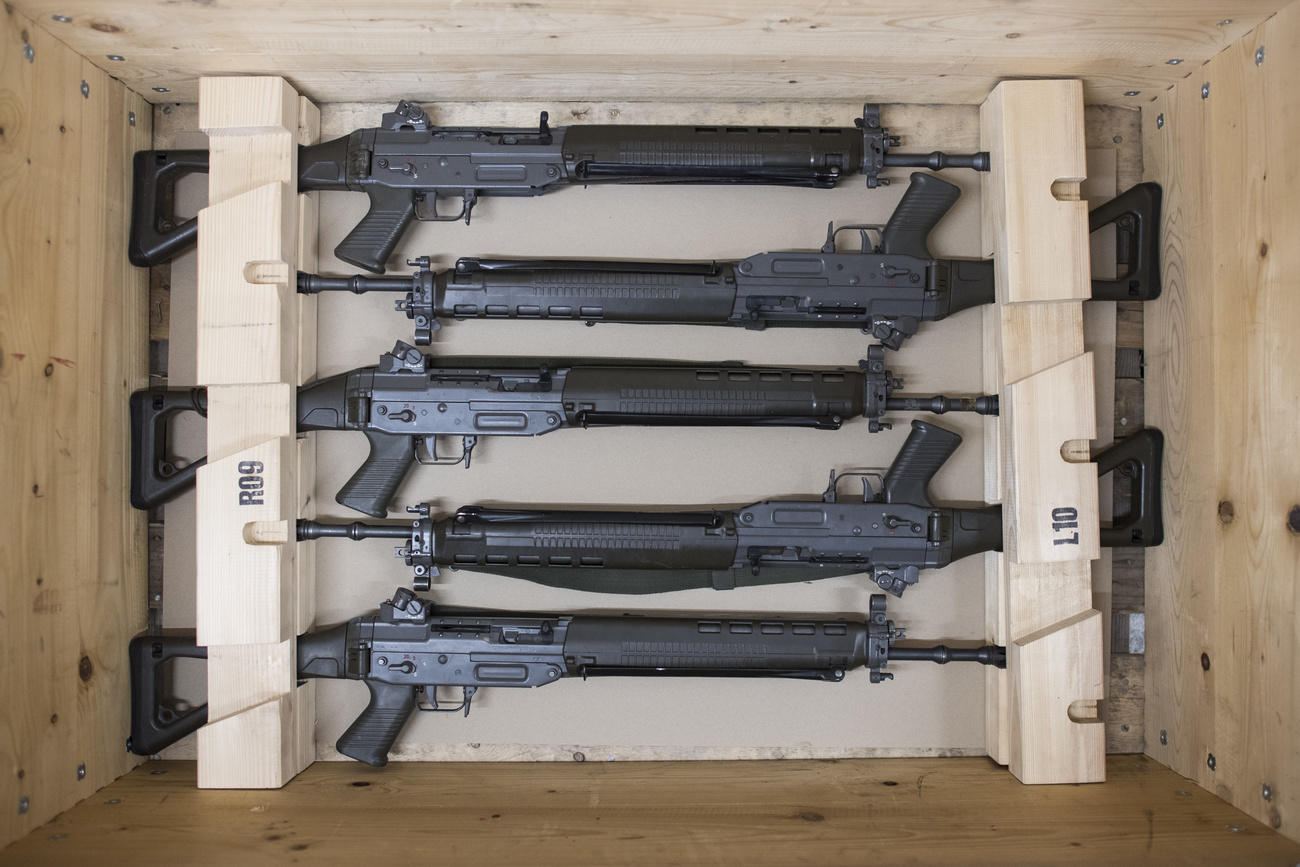National Bank’s independence ‘not affected’ by arms investment ban

Switzerland will soon vote on a people’s initiative to ban arms industry investments. The Swiss National Bank (SNB) is pushing for a “no” vote, arguing that the initiative curbs its independence. But the independence of the SNB is not absolute, economist Fabio Canetg writes.
Switzerland has only had second-hand experience of armed conflict for the past 172 years. But it is as indirectly involved as ever: the Swiss National Bank finances arms manufacturers. One of these is the United States company Raytheon, in which the central bank owns a stake worth CHF360 million ($393 million). Raytheon produces missiles that, according to the New York Times, were directed against the civilian population in the civil war in Yemen. Overall, the Swiss National Bank has about CHF20 billion invested in companies that sell weapons.
That should end soon, according to the demands of the people’s initiative “for a ban on financing producers of war materials”. The initiative proposes that the Swiss finance sector should in the future no longer be permitted to own shares in companies that earn more than 5% of their revenue from manufacturing war materials.
A parliamentary majority, the government and the Swiss National Bank are against the initiative. “Attacking the independence of the Swiss National Bank by curtailing its investments is a danger to the bank’s basic mandate,” Thomas Rechsteiner, a Christian Democratic People’s Party (CVP) lawmaker, warned in a parliamentary debate. The Swiss National Bank’s mandate is to maintain stable prices.
Monetary policy independence is essential
Where does this fear come from? The National Bank owes its independence to academic research. Following high inflation rates in the 1970s, academics said that only independent monetary policy could prevent runaway inflation from happening again. Free-spending finance ministries should no longer have access to the central bank’s money-printing presses.
That was the reason for granting the SNB comprehensive independence. It may no longer take any instructions from the government or parliament. The Swiss National Bank can determine its monetary policy autonomously.
This independence was important in the summer of 2012, when it had to spend more than CHF150 billion to defend the euro’s minimum exchange rate. It also allowed the SNB to scrap the minimum exchange rate in a surprise move in January 2015. The National Bank could only make this unpopular decision because it was operating outside the sphere of political influence.
The SNB is not above the law
The Swiss National Bank’s decisions are focused on the goal of achieving price stability. If other goals get in the way – whether political, economic or social – there is no longer a guarantee that the SNB can fulfill its mandate.
The independence of the SNB is therefore essential. But it is not absolute. It applies only to the field of monetary policy. Legislators can regulate anything unrelated to monetary policy at their own discretion. Labour and equality laws, for example, are also applicable to the SNB.
Whether or not the central bank has to apply the new rules on investment policy against its will is therefore immaterial. The question, rather, is whether the constitutional text that has been submitted would encroach on SNB monetary policy.
Andréa M. Maechler, a member of the SNB’s board, warned about exactly that in a 2019 presentation. The thrust of her speech was that monetary tightening would become more difficult if investment policy is more strictly regulated. If inflation threatened to exceed the desired upper limit at any point, the central bank would be forced to liquidate its assets quickly. That is not possible if there are too many limits on investment policy.
Selling assets is not an option
One example that illustrates this perspective: If lawmakers required the SNB to invest all its currency reserves in Facebook, then a sudden sale of this stock would have problematic effects. The SNB would cause Facebook shares to collapse, while other stock prices wouldn’t be affected.
The SNB lives in mortal terror of creating winners and losers on the stock market. It aims to shape operations to be as “market-neutral” as possible. Reducing its assets should move the entire financial market – and not the prices of individual stocks or investment categories.
But Maechler’s line of argument displays an outdated understanding of monetary policy. The Swiss National Bank would not sell its investments if inflation were to suddenly accelerate. It has other instruments to prevent the prices of goods and services from rising. It already proved that in 2010: at that time, the SNB was afraid that the inflation rate could increase sharply because of its currency sales. To stop that happening, the national bank didn’t sell its investments. It issued so-called SNB bills. These reduced the money supply without diminishing its assets.
The US central bank, the Fed, also tightened its monetary policy in 2015 without selling assets. It raised its interest payments to the banking system. This shows that monetary policy can function regardless of how easily a central bank can shed its investments.
The independence of the SNB is not endangered
This also seems to be the view of the European Central Bank. Its president, Christine Lagarde, has pushed for a greener ECB investment policy since she took office. She is unconcerned about the monetary policy implications of this new orientation.
In Switzerland, too, adopting the people’s initiative “for a ban on financing for producers of war materials” would have no monetary policy consequences. In all relevant areas, the central bank would remain independent with full capacity to act. Whether the SNB can invest in arms manufacturers or not simply has no relevance for monetary policy.
Author Fabio CanetgExternal link is a macroeconomist at the University of Bern, specialising in money markets.
Catherine Hickley

In compliance with the JTI standards
More: SWI swissinfo.ch certified by the Journalism Trust Initiative











Join the conversation!